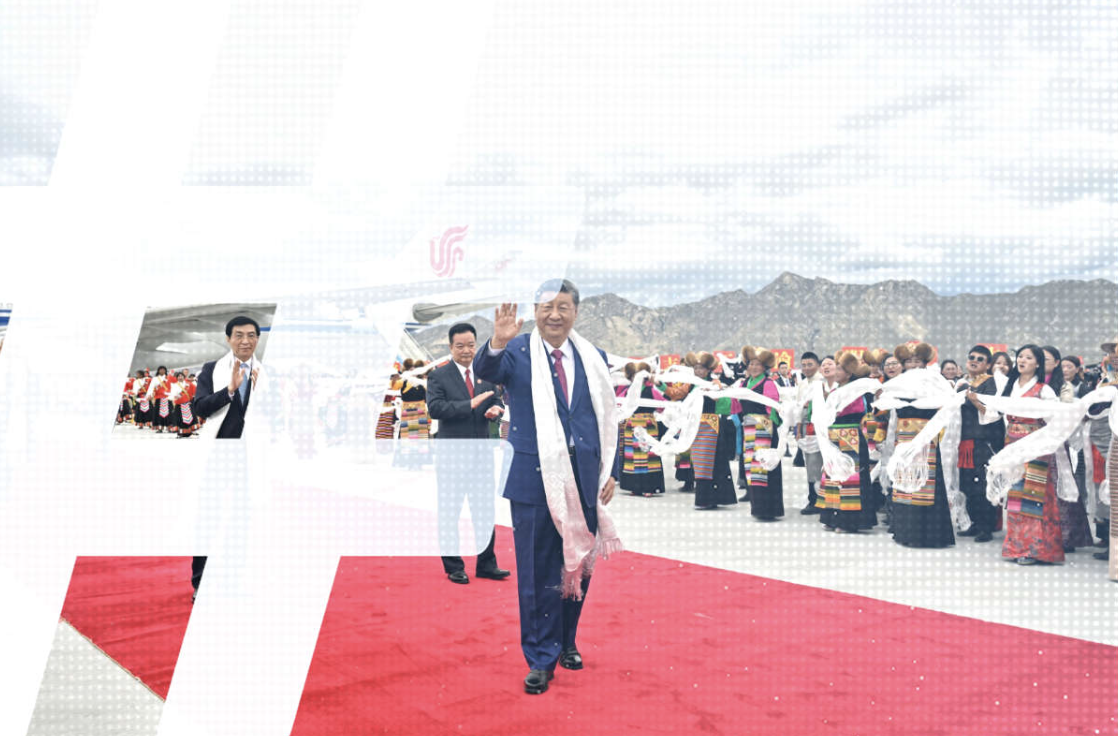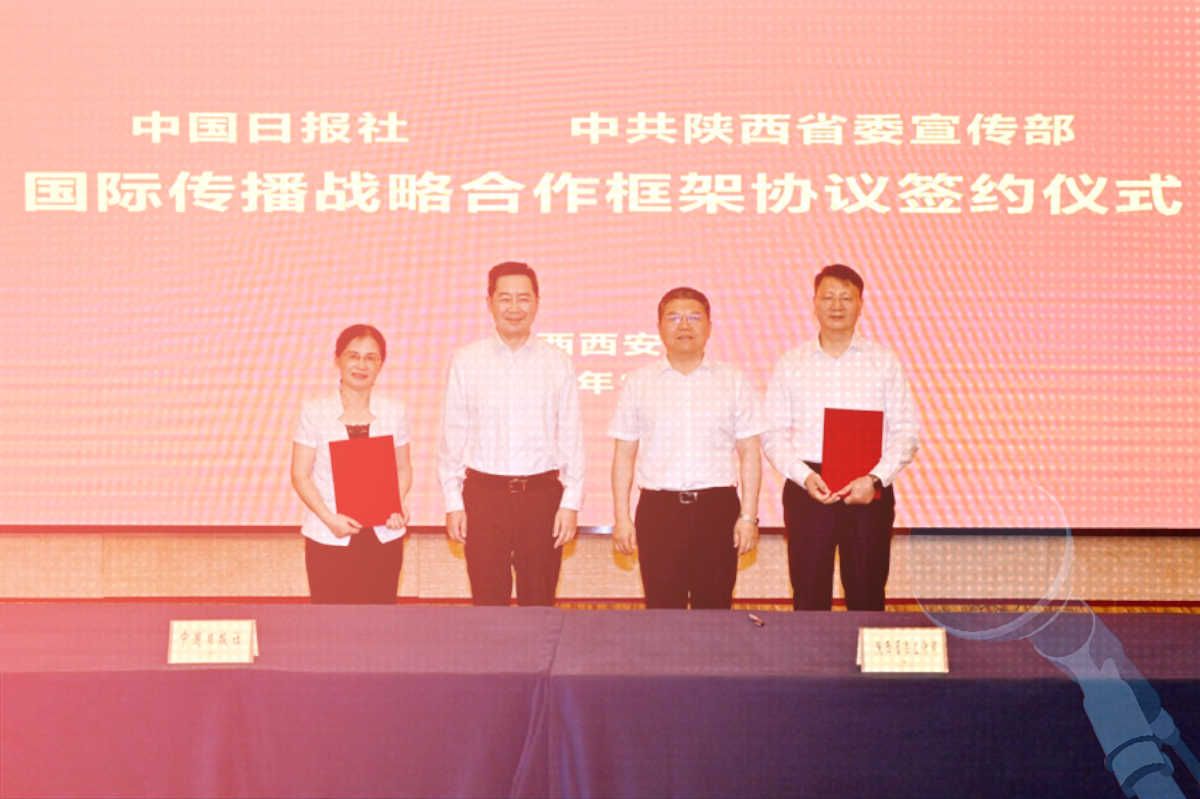Headlines and Hashtags
Xinhua News Agency steps out into the world
By David Bandurski — At the recent World Media Summit in Beijing, China’s official Xinhua News Agency placed itself at center stage with other international “media giants.” It was at once a symbolic enunciation of China’s coming of age as a global media superpower — whatever that means — and a reflection of China’s future ambitions in the arena of global information.
As we took pains to point out, Xinhua is far more than just another media organization, a fact that lent a strange asymmetry to the proceedings in Beijing.
For China, the summit was an act of statecraft. Xinhua was there representing not its own interests but those of the Chinese Communist Party as the embodiment of the nation’s voice. For the rest, the summit was about business. Rupert Murdoch was there, as he should have been, to represent his own interests and those of his shareholders — not our voices as Australians or Americans, Canadians or Indians.
Xinhua’s global information strategy is China’s global information strategy. But what exactly is that strategy?
We’ve been hearing for months now about how China is laying aside something like four billion US dollars to expand the presence overseas of core central media like China Central Television and Xinhua.
How is that global push — “going out,” as it is called in Chinese — going to take shape?
A recent article from the Media and Entertainment Industry Reporter offers some glimpses into developments at Xinhua this year and how the official news agency’s role globally is envisioned by CCP leaders.
The article’s chief source is Wu Jincai (吴锦才), deputy editor-in-chief of Xinhua News Agency and a key figure behind Xinhua’s push to develop television and online video content.
In an interview that follows the article Wu invokes a quote from Mao Zedong in the 1950s, in which he purportedly said, “Let Xinhua News Agency span the globe, let the whole world hear our voice.” Wu elaborates: “When we say international transmission, this is not about disseminating Chinese content overseas but about using Chinese voices and a Chinese perspective to view the news and view the world.”
Xinhua’s role is not just as a broadcaster, of course, but also as a mediator of content, as a kind of central political clearing house for global news. Xinhua is entrusted with China’s global media push because it can be trusted politically with “China’s voice.”
As one Chinese media scholar puts it rather euphemistically to the Media and Entertainment Industry Reporter:
Many local television stations are willing to use news from Xinhua News Agency. Right now that means text and image. In the future it will mean video material as well, because Xinhua News Agency is a news copy provider that “can maintain its grasp politically.” “There are a lot of people at Xinhua News Agency who really understand politics, who really understand [China’s] national circumstances. When these people produce news, it will be more grounded.”
The CCP’s determination to maintain “propaganda discipline” as central party media step out into the world is clear. But the article also hints at how “going out” — the primary goal of which is to change and influence “global public opinion” to the CCP’s advantage — might present realistic challenges to this objective.
Wu Jincai says, for example, that in the future Xinhua will “emphasize the localization of news bureaus, increasing the proportion of local hires.” How “grounded” in China’s political realities will those journalists be?
A partial translation of the Media and Entertainment Industry Reporter article follows:
“Xinhua News Agency television sets off on a run in 2009, influencing the television news arena“
[NOTE: “Xinhua News Agency TV” refers not to a television channel or station, but Xinhua’s audio and video content production and distribution business comprehensively.]
On March 1, 2009, Xinhua News Agency’s Chinese-language television channel was formally launched. On July 1, trial broadcasts began for Xinhua’s English-language news channel. On September 1, [Xinhua’s] Chinese-language television news channel was separated into [audiovisual] wire copy and programming channels. On the same day, Xinhua News Agency’s Mobile TV was launched through China Mobile, China Telecom and China Unicom, and Xinhua’s financial news channel, CFC, started broadcasting.
In late 2008, the news that Xinhua News Agency would launch its own television programming spread like wildfire. All of this stemmed from the July 2008 release by the agency’s leading party group of “Opinions on the Further Development of Xinhua News Agency Video Reports” (于进一步发展新华社视频报道的意见). In early 2009, Xinhua News Agency’s audio-visual department was restructured to form the Xinhua News Agency Audio and Video News Desk (新华社音视频新闻编辑部). At the same time, the Xinhua Audio-Visual Center (新华音像中心), originally an enterprise directly under Xinhua’s main office, was placed under the management of Audio and Video News Desk. All of these moves laid the foundation for the continued progress of “Xinhua News Agency TV” in 2009.
As it continues to launch television and new media products, the volume of original television news reports from Xinhua News Agency is continually increasing. “Right now Xinhua News Agency is offering between 600 and 700 minutes of original English-language television wire content and programming each day. The biggest advantage in the separating of channels is that the raw material and finished programming can be produced according to their own rules and specifications, and the duration of news can be further extended,” says Wu Jincai (吴锦才), Xinhua deputy editor-in-chief and head of the audio and video news desk. Originally, a goal of 480 minutes per day of original content was set for “Xinhua News Agency TV” in 2009 (and it was believed then that even something like 280 minutes per day would be difficult to manage), and 960 minutes per day for 2010. But the daily targets for this year have already been met. “Television equipment is now being provided to Xinhua News Agency bureaus at home and around the world, and we should start seeing a spike in news gathering this month. And once broadcast vehicles have been allocated, increasing the duration [of coverage] will not be a problem.” . . .
The Advantages of Xinhua News Agency TV
“The biggest advantage of Xinhua News Agency TV is [enhancing China’s] international communication capacity — the biggest stage and the biggest outlet is in taking part in the global competition for news,” says Wu Jincai.
Xinhua News Agency’s work strategy for 2008-2015 (新华社2008-2015年工作设想) points clearly to a three-step strategy for television development at Xinhua:
Step One — increasing the capacity for video content production, distributing the necessary equipment to overseas news bureaus.
Step Two — building up personnel, strengthening training, adding programs, and providing the necessary technologies.
Step Three — Building Xinhua News Agency as a standalone brand and developing a television broadcast platform reaching the consumer directly. (第三步,建立新华社独立品牌的、直接面向终端受众的电视播出平台)
As a state news wire, Xinhua News Agency has 31 bureaus domestically and more than 110 bureaus overseas, and these journalists provide the basic support for the production of television content for Xinhua. Li Xiguang (李希光), executive dean of Tsinghua University’s School of Journalism and Communication, says that the world’s top television reporters and commentators were all once leading print journalists. Xinhua News Agency has China’s best foreign correspondents. They are proficient in the local languages and are highly capable. These journalists are all graduates of various name-brand universities. In terms of talent, Xinhua News Agency’s advantages are clear.
Within the news industry Xinhua News Agency’s ability to get stories, carry out investigations and write internal reference documents (内参) [for the eyes of select officials, depending on the reference’s level of secrecy] is well regarded. It is felt that this owes to Xinhua’s longstanding reserve of talent, leadership and training. But Xinhua’s project of late is the creation of “television” not of a “television station.” How can “Xinhua News Agency TV” become known and accepted by more television viewers? Can its television news products be sold to more and more consumers? Concerning this, Wu Jincai says, “‘Xinhua News Agency TV’ is working to expand export [of its news products] in three ways. The first is the provision of video wire content to various media organizations. The second is using television programming at overseas television networks to interface with viewers. The third is to build Xinhua’s own television channels overseas to the extent this is financially possible.
Professor Liu Hong (刘宏) of the Television and News School of Communications University of China says it should be no problem for “Xinhua News Agency TV” to export [its news products]. Ever since the Yan’an period, [Xinhua] has been active as a news service and gatherer of information, so in terms of export [of information] overseas, as the state arranges the overall dissemination structure [of information export] it will extend to Xinhua News Agency a definite degree of authorization. For [information] distributed domestically, right now the trend of media convergence is becoming more and more obvious, and in the future video material will flow more freely. Many local television stations are willing to use news from Xinhua News Agency. Right now that means text and image. In the future it will mean video material as well, because Xinhua News Agency is a news copy provider that “can maintain its grasp politically” [NOTE: This means Xinhua is most directly subject to propaganda discipline, or controls, and careful in maintaining the party line]. “There are a lot of people at Xinhua News Agency who really understand politics, who really understand [China’s] national circumstances. When these people produce news, it will be more grounded.”
Zhao Guohui (赵国辉), Heilongjiang Satellite Television’s representative in Beijing, says that there are more and more new media channels [for video content] in addition to the demand for video news content at local television stations. Therefore, the demand for “Xinhua News Agency TV” content will be substantial. But television media rely largely on advertising, so there will not be sizable income from the simple provision of news products. If consumer and product information is used to support advertising products, however, simply posting online video content to Xinhua Online should yield substantial income.
Editorial Structure
For now Xinhua News Agency’s overseas bureaus are provisionally divided into three types. Seven main bureaus and the Tokyo, Paris and Rio De Janerio bureaus are already equipped with two to three professional television journalists each. These are designated as [Xinhua’s] professional television journalism teams. Ten bureaus, including the Washington and Berlin bureaus, have print journalists producing video programs and these constitute [Xinhua’s] informal television production workforce. Aside from these two categories, ten bureaus are training a large number of local reporters to take on the work of filming and editing, and they work with bureau reporters to send back reports. This group is known as [Xinhua’s] reporting team. “In the future we want to emphasize the localization of news bureaus, increasing the proportion of local hires,” says Wu Jincai.
According to expertise, professionalism and general hiring standards, Xinhua News Agency is hiring from local television stations and universities around the country. Up to July 8, 2009, Xinhua’s 31 domestic bureaus had already hired 96 television journalists. The Audio and Video News Desk has been actively hiring since its creation in 2009, going from under 100 personnel at the beginning of the year to close to 300 today. Moreover, two-thirds of personnel are under the age of 40, including many from local television stations.
Television is an industry combining many different skill sets, and the demand of combining various work skills grows in particular once live programming becomes the norm . . .
“In filming for television, you can’t just concentrate on the image and forget about ideas,” [says Wu Jincai]. Xinhua’s existing television team has a feel for how to film for television, then there are those who come from a writing background. One important task for the audio and video news division [of Xinhua] is drawing on the strengths of both groups . . .
[Long section here on various Xinhua columns, programs and reports taken on in recent years.]
On July 1, Xinhua News Agency’s English-language news channel was launched on a trial basis, with 90 minutes of content broadcast per day. In the Urumqi riots that shortly followed, Xinhua News Agency journalists on the front lines managed to get hard to obtain footage of the chaos, and this material was quickly relayed to users. Many media in China and overseas, including 20 well-known global media, have become clients of the service on a trial basis. The launch of the English-language service not only enhances Xinhua News Agency’s transmission capacity (传播能力) overseas, but at the same time increases the effectiveness of Chinese [state] media in influencing public opinion overseas. In the future, Xinhua News Agency will also actively encourage personnel at its various bureaus, according to their own needs, to get Chinese and English content into other local languages and broadcast it locally.
It is the hope of Xinhua News Agency President Li Congjun (李从军) that Xinhua’s English-language channel provides overseas not only Xinhua’s own content but also programs from various domestic television stations and other sources, becoming a global platform for the provision of Chinese television news content in order to achieve competitiveness on a much higher level. Many media groups, including CNN and Reuters, are already moving into this market . . .
[Posted by David Bandurski, October 22, 2009, 11:40am HK]




















